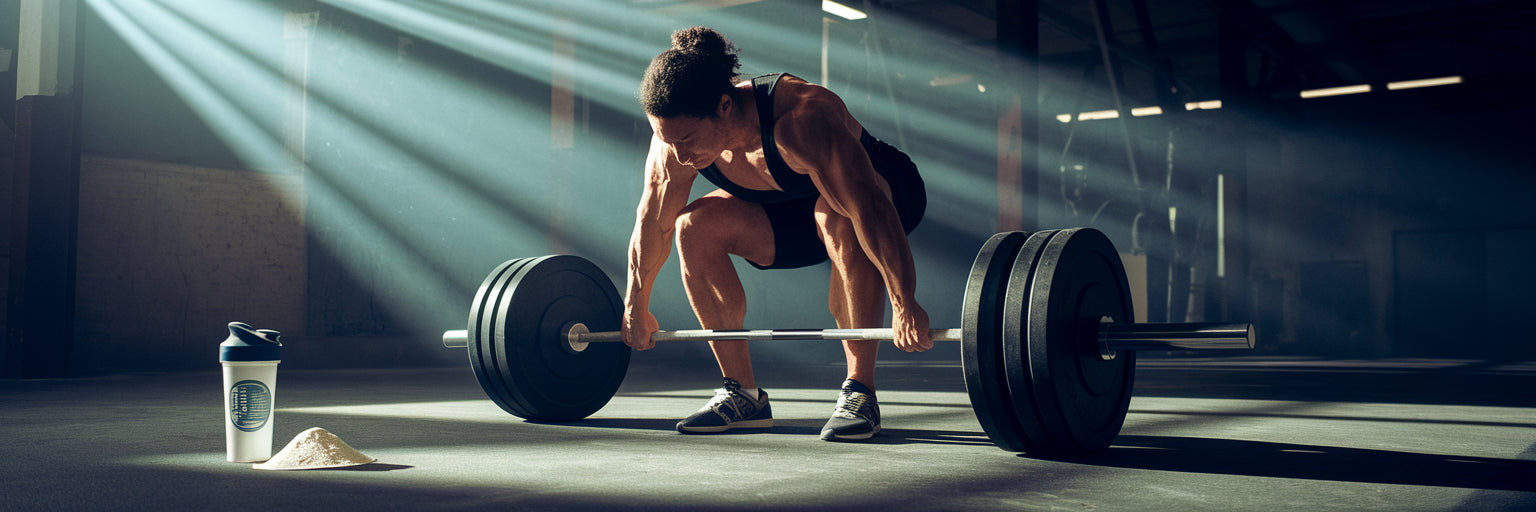The Plant-Based Athlete's Performance Puzzle
As a dedicated vegan athlete, you already know that optimizing your nutrition is just as important as your training regimen. You meticulously plan your meals and track your macros to ensure you have the fuel for peak performance. But what if there’s a missing piece in your strategy, something that could help you push past your current limits? For many, that piece is creatine monohydrate.
Because plant-based diets do not include the primary dietary sources of creatine, like meat and fish, vegan athletes naturally have lower levels of creatine stored in their muscles. This isn't a setback. Instead, it's an opportunity. Supplementing with creatine can help close this gap, significantly enhancing your plant-based athletic performance.
Think of this as your complete guide. We’ll walk through what creatine is, how it works, and why it’s especially beneficial for you. We will also cover how to use it correctly, clear up some common myths, and show you how to pair it with vegan protein for the best results.
How Creatine Fuels Your Muscles
So, what exactly does creatine do? Let's skip the dense scientific jargon. Imagine your muscles have tiny, rechargeable batteries that power every explosive movement you make, whether you're lifting a barbell, sprinting, or jumping. These batteries run on a molecule called ATP (adenosine triphosphate), which is your body's direct source of energy.
During high-intensity exercise, you use up ATP very quickly. This is that moment in your workout when you feel you just can't squeeze out another rep. Creatine acts like a rapid battery recharger. When you supplement with it, your body stores it as phosphocreatine. This stored phosphocreatine quickly donates its phosphate group to regenerate ATP, effectively recharging your muscle's energy supply in seconds.
This process allows you to sustain high-intensity effort for longer. The tangible results are what matter: more strength, increased power output, and the ability to complete those extra reps that stimulate muscle growth. While your body produces a small amount of creatine on its own, it’s often not enough to meet the demands of intense training. This rapid energy regeneration is central to many of creatine's advantages, which you can learn more about in the insights we shared about creatine benefits.
The Vegan Advantage with Creatine Supplementation

Now, let's talk about why this is particularly important for you. Since your diet doesn't provide creatine, your baseline muscle stores are naturally lower than an omnivore's. This might sound like a disadvantage, but it actually creates a unique opportunity. When you start supplementing, the performance improvements you experience can be even more noticeable.
Think of it like filling a tank that starts closer to empty. You have more room for improvement. As Vegan Health points out, this lower starting point is why supplementation can be so effective for those on a plant-based diet. The benefits of creatine for vegan athletes go beyond just lifting heavier weights. It can help you push harder during high-intensity interval training (HIIT), reduce mental fatigue during long and grueling workouts, and even support faster recovery between sessions.
And if you're concerned about its origins, you can rest easy. All commercially available creatine monohydrate is synthetically produced in a lab. It is not derived from animal products, making it 100% vegan-friendly and perfectly aligned with your ethical choices. You are not just supplementing; you are strategically giving your body a tool it can't get from your diet.
| Factor | Vegan Athlete | Omnivore Athlete |
|---|---|---|
| Baseline Muscle Creatine | Significantly lower due to no dietary intake | Higher due to intake from meat and fish |
| Performance Increase | Often more pronounced and noticeable | Effective, but gains may be less dramatic |
| Cognitive Function Boost | Potential for greater improvement due to lower baseline | Less pronounced effect on cognition |
| Dietary Creatine Intake | Virtually zero | 1-2 grams per day on average |
This table illustrates why creatine supplementation can have a more significant impact on vegan athletes. The data is based on established physiological differences in baseline creatine stores between vegan and omnivorous diets.
Your Guide to Dosage and Timing
Ready to get started? Learning how to take creatine is simple, and consistency is far more important than perfect timing. Here’s a straightforward guide to follow:
- Standard Dose: The most scientifically supported approach is to take 3-5 grams of creatine monohydrate daily. This is enough to fully saturate your muscles over a few weeks and maintain those levels. For a simple and effective option, our pure creatine monohydrate powder is the gold standard.
- Loading Phase (Optional): You might hear about a "loading phase," which involves taking about 20 grams per day for 5-7 days to saturate your muscles faster. This can help you see results a bit quicker, but it is not required. A consistent 3-5 gram daily dose will achieve the exact same long-term benefits.
- Timing: When should you take it? Honestly, whenever you will remember to. Consistency is the most critical factor. Some studies suggest taking it post-workout with carbohydrates and protein can slightly improve absorption, but the difference is minor. The best time to take creatine is the time that fits seamlessly into your daily routine.
The main takeaway is this: just mix 5 grams into your daily shake, a glass of water, or your favorite drink. The key is not to miss a day.
Clearing Up Common Creatine Myths

With any popular supplement, misinformation can spread. Let's address some of the most common myths about creatine so you can feel confident in your choice. The question "is creatine safe for vegans?" has been answered with a resounding "yes" by decades of research.
Myth: Creatine Harms Your Kidneys
This is one of the oldest and most persistent myths. The truth is, for healthy individuals, creatine has been proven to be safe at recommended doses. It is one of the most extensively studied supplements on the market, and countless studies have found no evidence of harm to kidney function in healthy people.
Myth: Creatine Causes Dehydration and Cramping
This is another common misconception. Creatine actually works by pulling water into your muscle cells, a process called cell volumization. This is beneficial for muscle growth and performance. As long as you maintain normal, healthy hydration habits by drinking enough water throughout the day, creatine does not cause dehydration or cramping.
Myth: Creatine Makes You Bloated
Some people notice a slight increase in weight when they first start taking creatine. It's important to understand that this is intracellular water, meaning water inside your muscles, not subcutaneous water under your skin that causes a "puffy" look. This extra water in the muscle contributes to a fuller appearance and supports performance. In fact, as WebMD reports, long-term use of creatine at recommended doses has been shown to be safe. For more answers to common questions, you can check out our detailed FAQs page. As always, it's a good idea to consult with a healthcare provider before starting any new supplement regimen.
Pairing Creatine with Vegan Protein for Maximum Gains
To get the most out of your training, think of creatine and vegan protein as a power couple. Creatine provides the energy to push through more intense workouts, creating a greater stimulus for muscle growth. Protein then provides the essential amino acids needed to repair and rebuild that muscle tissue, making you stronger.
Combining these two vegan muscle building supplements is a simple and highly effective strategy. Look for high-quality vegan protein powders made from sources like pea, soy, or a blend of plant proteins to ensure you're getting a complete amino acid profile for optimal muscle protein synthesis.
Here’s a simple, actionable tip: add your 5-gram serving of creatine directly into your post-workout vegan protein shake. Mixing your creatine with a scoop of our delicious chocolate vegan protein makes for a perfect recovery drink that replenishes your energy and kicks off muscle repair simultaneously. Together, they are some of the best US supplements for energy and performance.
If you need some inspiration, we have some easy vegan protein recipes you'll actually crave. What’s your favorite post-workout shake? Share your recipe in the comments below!



